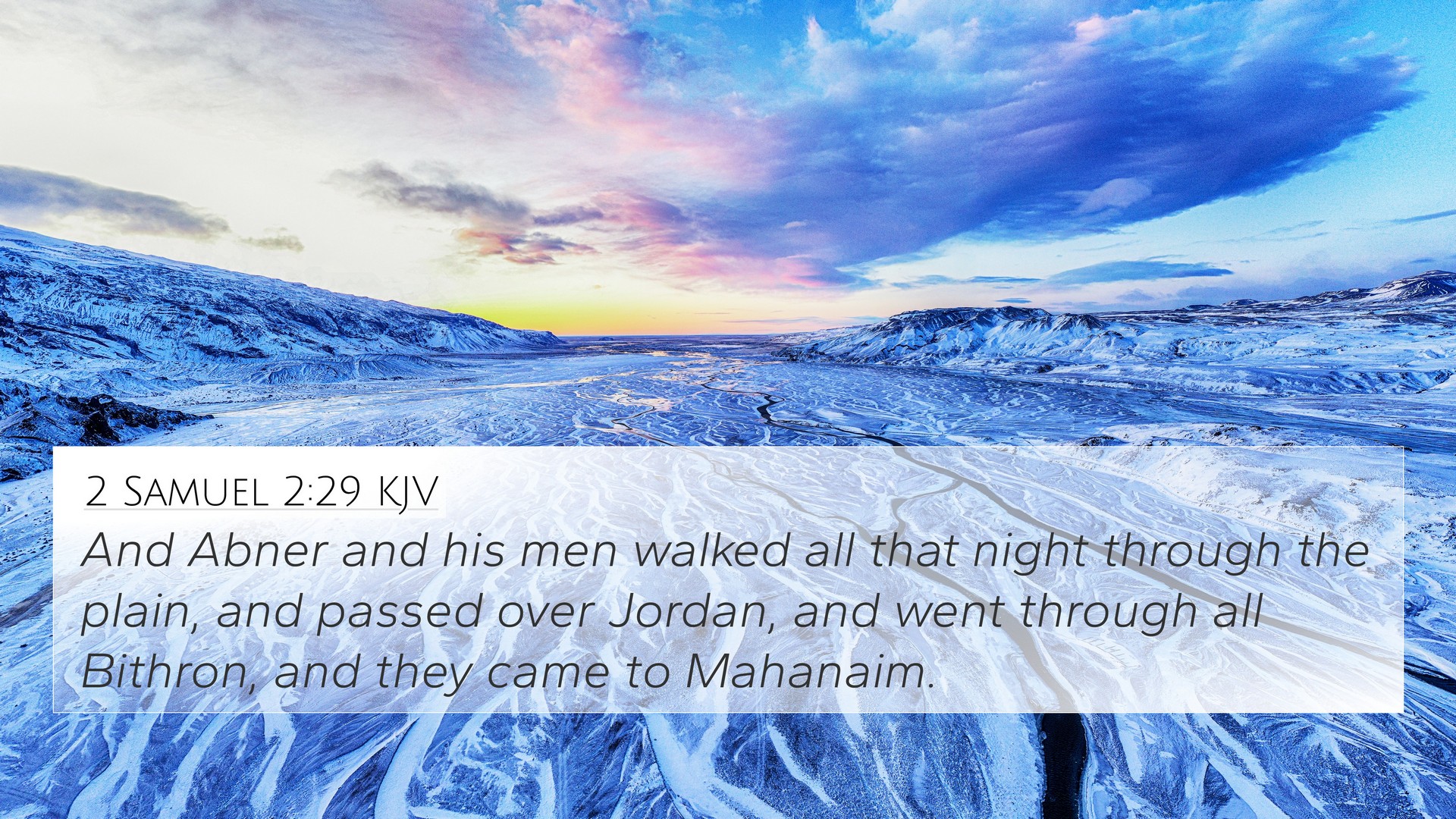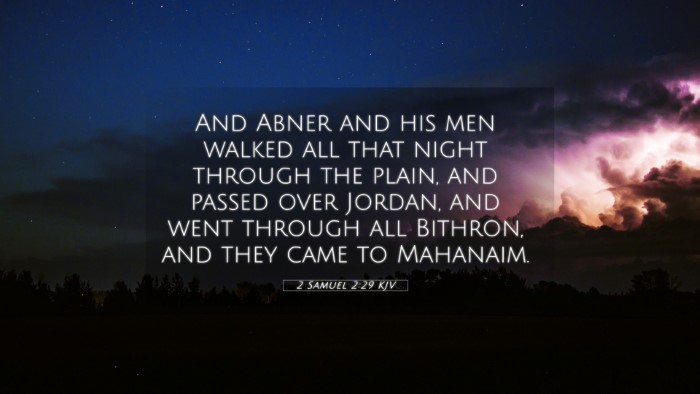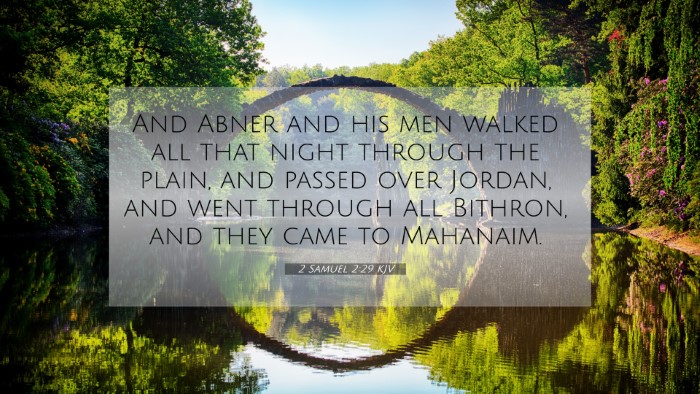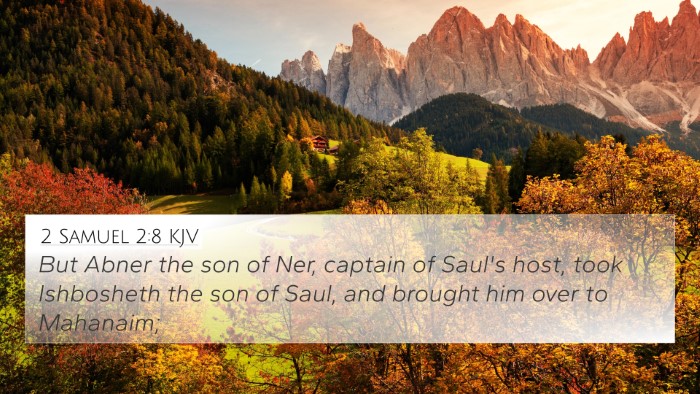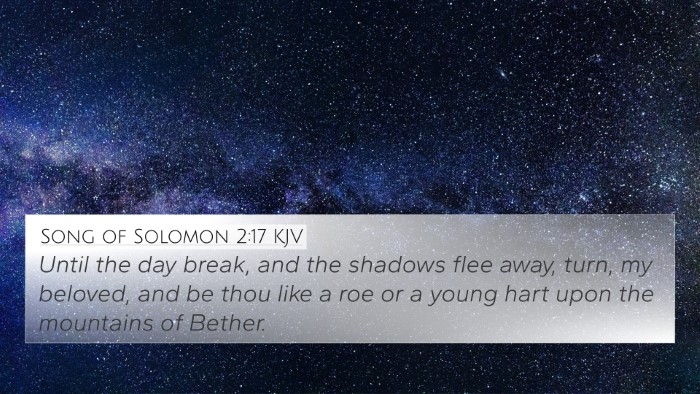Understanding 2 Samuel 2:29
Bible Verse: "And Abner and his men went all that night through the plain, and passed over Jordan, and went through all Bithron; and they came to Mahanaim." (2 Samuel 2:29 KJV)
Summary of Meaning
The passage describes a night of significant movement and strategy following the conflict for leadership after the death of Saul. Abner, one of Saul's remaining supporters, is fleeing to regroup with his allies, demonstrating the turmoil and challenges present in Israel's leadership during this period.
Insights from Public Domain Commentaries
Matthew Henry's Commentary
Matthew Henry notes that Abner's retreat reflects the unpredictability and chaos of this transitional period in Israel's history. He emphasizes the urgency of Abner's actions, symbolizing the need for leadership and stability in the face of division. Henry discusses how Abner—a key military leader—was forced to flee, indicating a moment of defeat but also the potential for future reorganization and strategy.
Albert Barnes' Commentary
Albert Barnes highlights the geographical significance of the locations mentioned in the verse—particularly Mahanaim—as a place of refuge and safety. He explains that Abner's journey symbolizes the search for strongholds amidst turmoil. Barnes also points out that this movement signifies the continuing conflict within Israel and the critical stakes involved in the shifts of power during this time.
Adam Clarke's Commentary
Adam Clarke provides additional details about the geographical areas mentioned, offering insights into the historical and cultural implications of Abner's journey. He argues that Abner's movement illustrates the broader theme of loyalty and the challenges of unifying a divided kingdom. Clarke emphasizes that this verse serves as a transitional moment, setting the stage for future conflicts, intrigue, and the eventual establishment of David as king.
Bible Verse Cross-References
- 1 Samuel 31:1-13 - The death of Saul and its aftermath.
- 2 Samuel 1:1-16 - David learns of Saul’s death.
- 2 Samuel 2:1-4 - David is anointed king over Judah.
- 2 Samuel 2:11 - The duration of David’s reign in Hebron.
- 2 Samuel 3:1 - The long war between the house of Saul and the house of David.
- 2 Chronicles 16:11 - Distress and warfare in Israel reflecting similar turmoil.
- Job 5:11-12 - God exalts those of low degree, symbolic of David’s rise.
- Isaiah 11:10-12 - The covenant of peace that follows in the line of David.
- Matthew 12:3-4 - Jesus referencing David as significant amidst conflict.
- Hebrews 7:14 - The priesthood of Jesus in relation to the line of Judah, showing continuity.
Connections Between Bible Verses
This verse highlights significant themes, namely the struggle for power and transitions in leadership that reverberate throughout Scripture. As we explore the connections between various verses, we see how Abner's actions and their consequences shape the narrative surrounding David's eventual rule.
Comparative Bible Verse Analysis
By comparing 2 Samuel 2:29 to other instances of leadership struggles found in the Bible, such as the conflicts during the reign of Saul and the leadership transitions in Kings, we can glean insights about divine providence, loyalty, and the establishment of God's chosen leaders.
Cross-Referencing Biblical Texts
Cross-referencing biblical texts enhances our understanding of 2 Samuel 2:29. The turmoil following Saul's death resonates with the themes found in other biblical narratives where conflict precedes divine resolution, evident in transitions during the time of the Judges, as well as in the New Testament leadership struggles seen in the early church.
Bible Cross-Reference Guide
For those studying this passage, using a bible concordance or a bible cross-reference system can greatly aid in identifying connections. Such tools allow for a more profound understanding of how Abner’s flight and the subsequent events contribute to the overarching themes of leadership struggles and God’s sovereignty throughout Scripture.
Tools for Bible Cross-Referencing
Using resources like a Bible chain reference can assist in linking similar verses that address topics of conflict, leadership transitions, and God's plan. This approach allows for a comprehensive understanding while providing comprehensive bible cross-reference materials that enrich one's study.
User Intent Keywords
For those looking to discover how this particular verse connects to other scripture, questions such as "What verses are related to 2 Samuel 2:29?" can lead to a fruitful study of the themes present in the Bible regarding leadership and divine guidance.
Conclusion
In summary, 2 Samuel 2:29 reflects a moment of critical transition and conflict within the leadership of Israel. By exploring this verse through the lens of various commentaries and cross-referencing biblical texts, one can appreciate the richness of biblical narrative and the enduring themes of divine providence amidst human conflict.
